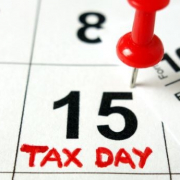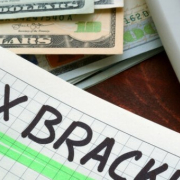Stimulus Checks And Your 2020 Taxes: Important Stuff You Should Definitely Know
 Your taxes have a lot more to do with your stimulus checks than you may think — and that goes for the first and second direct payments as well as a potential third stimulus check.
Your taxes have a lot more to do with your stimulus checks than you may think — and that goes for the first and second direct payments as well as a potential third stimulus check.
Here’s everything you need to know, especially with Tax Season 2020 just around the corner. For example, your federal income tax plays a major role in determining the size of the check the IRS will send you, and if you qualify for a stimulus check at all. The IRS is also using this year’s tax return (for taxes on your 2020 income) to pay you money you should have received, but didn’t.
So if you don’t get your second-round stimulus payment, by the end of next week (some people may still receive a direct deposit or mailed check or EIP card in the next few days,) you’ll most likely need to claim your payment on your federal taxes this year. With tax filing season set to start in a little less than four weeks, you have time to collect the paperwork you’ll need to claim a payment.
You may have additional questions about how tax returns and stimulus checks go together, along with how your dependents figure in, whether the payment counts as taxable income when you file, and what happens if you aren’t normally required to file a federal tax return. Plus, here’s information about a third stimulus check for potentially $1,400 or $2,000 per qualified adult.
What if I didn’t get my second stimulus check? What’s a Recovery Rebate Credit?
The December stimulus bill set a Jan. 15 cutoff for the IRS and US Treasury to send the second stimulus payment to bank accounts and through the mail. Unless the IRS mailed your check right at the deadline or your payment is caught up in a direct-deposit holdup with tax preparers, you’ll need to claim money from the $600 stimulus check when you file your federal tax returns this year as a Recovery Rebate Credit on the 2020 Form 1040 or Form 1040-SR. You can also claim money the IRS owes you from the first round of stimulus checks, authorized last spring — millions are owed a catch-up payment for child dependents.
To help work out whether you’re missing a payment, and for how much, the IRS provides a Recovery Rebate Credit Worksheet. You’ll need the IRS’ calculated amount from the letter the agency will send you, called Notice 1444 for the first payment and Notice 1444-B for the second payment.
When’s the soonest I can claim my stimulus credit on my taxes?
According to the IRS, you’ll be able to claim your missing payment on your taxes in about a month, with any payments going out after. The IRS said you can start preparing your taxes now — through its Free File tax preparation service if you qualify to use it — or through a tax-preparation service. The first day the IRS will begin accepting and processing individual tax returns is Feb. 12. The tax-filing deadline is April 15 this year.
What if I’m not normally required to file a tax return?
According to the IRS, to claim the Recovery Rebate Credit, you need to file Form 1040 or Form 1040-SR, “even if you are normally not required to file a tax return.”
The IRS says anyone with an income of $72,000 or less can file a federal tax return electronically for free through the IRS Free File service.
Will I have to pay taxes on my stimulus check money?
No, a stimulus payment doesn’t count as income so you won’t owe tax on it, the IRS has said.
I didn’t file a tax return in 2019. Do I still qualify for a payment?
If you weren’t required to file a 2019 tax return because you were below income limits or you receive federal benefits such as Social Security, you could still qualify for a payment. Up to 9 million people who fell into this “non-filers” category were owed a first stimulus payment as of last fall.
Though many people in this category should’ve received their second payment automatically, if the IRS doesn’t send your money by the start of tax-filing season, you’ll need to file a federal tax return this year to claim your missing payment with the Recovery Rebate Credit, the Tax Foundation said.
How do my tax returns affect the total stimulus amount I can receive?
The IRS uses the adjusted gross income, or AGI, from your 2019 federal tax return to calculate how much of the $600 payment and how much of your future payment your household will receive. Your AGI may be a different figure from your annual salary or take-home pay, based on a variety of factors.
What’s the link between stimulus checks, dependents and taxes?
For the second check, you could receive up to a $600 payment for each dependent under age 17 whom you claim on your taxes. The definition was more narrow than dependents who’d be eligible for certain credits under tax law, including children 17 and older, dependents of any age with disabilities, and older adult relatives.
Could the status of my dependents come closer to tax law with a third check?
President-elect Joe Biden is proposing, as part of a larger economic-rescue package, a third round of checks for $1,400. Under Biden’s plan, dependents of any age would qualify for this third check.
If I lost my job or got a new one since I filed taxes, do I qualify for a stimulus check?
If your financial situation changed after you filed your 2019 tax return — for example, you received less income — you can claim that additional amount on your 2020 tax return when you file this year.
How will my stimulus payments affect how much I owe on this year’s taxes?
If you got a payment last year, it won’t reduce your tax refund or increase what you owe when you file your 2020 tax return this year. The payment also doesn’t count as income to determine if you’re eligible for federal government assistance or benefit programs.
How can my 2019 tax returns help me get a second check quicker?
Depending on your personal tax situation, the Recovery Rebate Credit for your missing stimulus money would either reduce the total amount you owe to the IRS or give you a larger tax refund.
If the IRS has your direct deposit information from a previous federal tax return, the agency will attempt to deposit your check in the bank account you provided. If you receive your tax refund by check in the mail, however, or if the IRS info or your bank information is out of date, the agency will send your refund in the mail. The IRS didn’t accept direct deposit information for the $600 check, but you should be able to register a new account with your 2020 tax filing.
Do I have to return any money if I qualify for less with next year’s taxes?
You won’t be required to pay back a stimulus payment if, based on your 2020 tax returns, you no longer qualify for the amount you received. Here’s when the IRS expects you to return full or partial stimulus check payments.
Could the IRS take my stimulus money to cover other payments I owe?
For the second check, if you owe federal taxes or have other federal debts, the IRS won’t reduce your stimulus payment to cover those. It also won’t redirect any past-due child support you owe. And debt collectors can’t garnish your payment either,
Source: c/net



